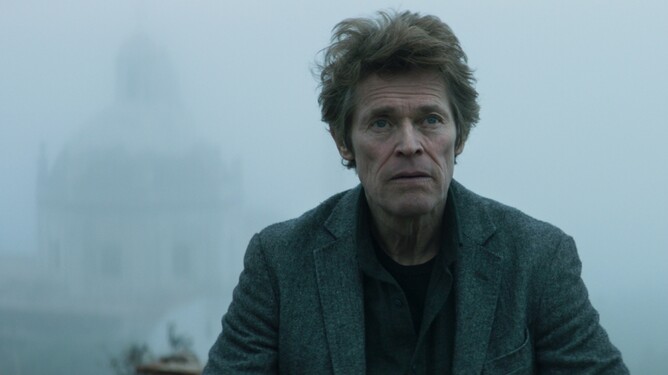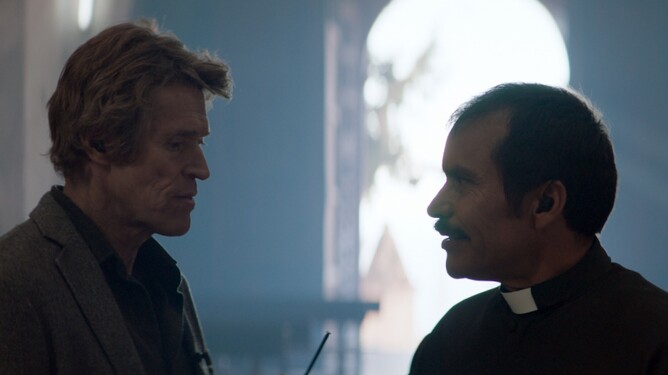OPUS ZERO is in selected UK Cinemas from 9th August 2019, & available on Curzon Home Cinema.
OPUS ZERO, opens simply with a beautiful wide shot of the Mexican landscape. Paul, played by Willem Dafoe is an American composer, whose Father has just passed away in a remote Mexican village. Paul arrives and begins to undertake the sad tasks that befall any son in this situation, but he welcomes the time alone to finish a piece of music he’s working on. However, when he inadvertently hears the story of a missing woman, he is engrossed, and wanting to find out what happened to her, he starts to interview some of the local people. As the two strands of his purpose play out, the necessary and the chosen, they intertwine and open up a dialog inside Paul about his own mortality, life and future.
Set in the lonely, majestic countryside of Mexico, OPUS ZERO, is a film that washes over the viewer, and is absorbed by osmosis rather than rational assessment. This is the film’s charm, and from the outset those seeking a stronger conflict or dramatic story will probably be a little frustrated. However, go along with the Mexican magic, and it’s possible to almost feel like you are in the village with Paul, such is the rather hypnotic persuasion of Willem Dafoe’s performance portraying Paul’s personal, inner narrative. The editing and sound track are subtle, sensitive and bravely minimalist, which also helps build this time and place in space. The understated but emotive score, is composer Colin Matthews’s first credit, and it works very well with the atmospheric wonder of the scenery and the loneliness of the characters that inhabit this world.
There is also a ‘real time feeling’ about OPUS ZERO, for the audience, yet at the same time it’s as if Paul has somehow stepped out of the normal rhythm of his life into a dream-like, suspended animation. This sense is helped and aided by a lot of cutaway shots of where Paul is, and point of view shots, which help him, and the viewer to drink in the village where his Father lived. It also helps him as he unravels the story line of the woman whose disappearance so intrigues him.
Full of echoes of the past, religious and spiritual references, textures and atmospheric levels, OPUS ZERO, poses questions to the audience as much as it does to the central character, Paul. It also allows the audience to explore its own theories and come to conclusions in a very similar way to how Paul does throughout the film.
The edit by experienced editor, Yibran Asuad is seamless, stylish, and flows well. The cinematography, by Matias Penachino is beautifully spot on for telling the story, with excellent framing. This, along with Director Daniel Graham’s vision, all add up to an understanding of visual storytelling that’s very classical, reminiscent of Stanley Kubrick or David Lean’s filmmaking. The film is seamlessly slick, and creates an evocative mood. So ponder along with Paul, share his journey, this is a slice of life and a window on a man’s inner quest rather than a fast-moving dramatic story.
OPUS ZERO is the first feature from writer/director/producer Daniel Graham, and his talent for original story concepts, the amalgamation of sound and vision, as well as directing actors into a film that feels ‘real,’ clearly shines. Shot for a low budget, OPUS ZERO, also reminds the viewer that script, technical know-how, vision and nifty financial footwork still go a long way to create something good and can still attract great actors.
OPUS ZERO is in selected UK Cinemas from 9th August 2019, and also available on Curzon Home Cinema.
Find an OPUS ZERO screening here.
www.curzonhomecinema.com/film/...
Jane Foster
janecreates@23-films.com


